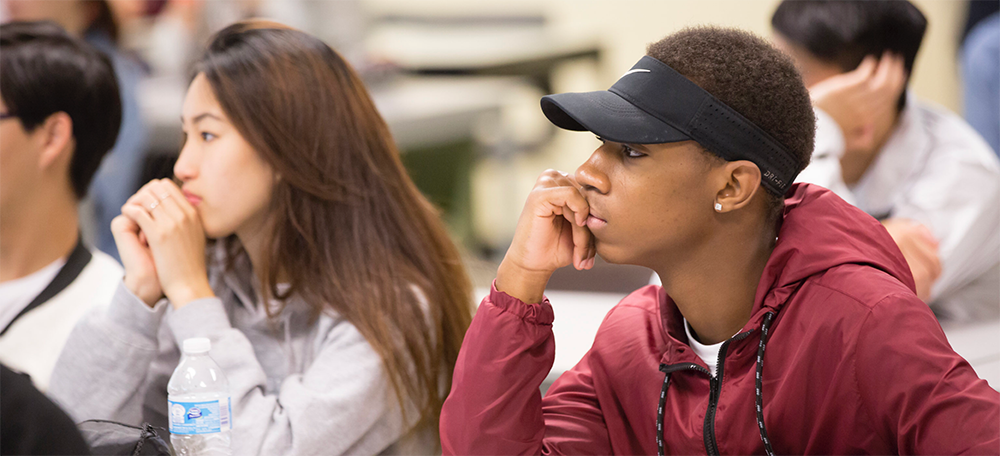
Many students change their mind about what to major in. That’s why we have you declare your major at the end of first year for Honours Arts and for Honours Arts and Business. You'll have time to explore before committing to a major.
In second year, when you make a decision about a major, you can add an optional double major, minor, diploma, or specialization. Your academic advisor can help you make these decisions.
Majors
The 28 majors you choose from are:
- Anthropology
- Classical Studies (or Classics)
- Communication Studies (or Communication Arts and Design Practice)
- Economics
- English (choose Creative and Professional Writing, Literature, Literature and Rhetoric, or Rhetoric, Media, and Professional Communication)
- Fine Arts (choose Studio Practice or Visual Culture)
- Political Science
- Psychology
- Religious Studies
- Sexuality, Marriage, and Family Studies
- Social Development Studies*
- Sociology
- Theatre and Performance
*also available as
an entry program
Auditions Music or Theatre and Performance
- In Music, auditions for first-year Music studio courses take place during fall orientation and the first week of class in winter. If you’re interested in Music as a major for second year, however, you may attend early auditions in March for Music studio courses. The Music Department will help you with the details. Non-studio music classes do not require an audition.
- In Theatre and Performance auditions for advanced acting classes are usually held the first week of each term.
Double major
If at the end of first year you would like to combine two major study areas, pursuing an Honours double major may be the solution. At Waterloo, almost any two Honours Arts majors can be combined. Also, many Honours Arts majors can be combined with a number of honours majors offered in other faculties. Arts students who wish to pursue an Honours major with another faculty should refer to available Arts academic plans in the Undergraduate Calendar.
If you're interested in doing two majors, consult with your academic advisor during first year. Each major in Arts is 16 courses and the Bachelor of Arts degree requires 40 overall courses.
Minors
Pursuing a minor allows you to complete a group of courses in specific study areas, though your major remains your primary area of study. Once you're in second year, you can pursue a minor in most Arts major disciplines or in many disciplines in other faculties. When you're ready to add a minor, you'll complete a plan modification form. Minors in Arts are optional and require 8 courses.
Minors offered by the Faculty of Arts:
- Anthropology
- Applied Language Studies
- Canadian Politics and Public Policy
- Canadian Studies
- Catholic Studies
- Church Music and Worship
- Classical Studies
- Cognitive Science
- Communication Studies
- Cultural Identities
- Digital Arts Communication
- East Asian Studies
- Economics
- Economic Theory
- English
- Fine Arts Studio
- French
- Peace and Conflict Studies
- Philosophy
- Political Science
- Politics and Business
- Psychology
- Religious Studies
- Russian and East European Studies
- Sexuality, Marriage, and Family Studies
- Social Development Studies
- Social Innovation and Impact
- Sociology
- Spanish
- Studies in Islamic and Arab Cultures
- Technical and Professional Writing
- Performance Creation
- Visual Culture in a Global Context
*The Human Rights minor is also offered as part of a double degree in human rights and law with the UK's University of Essex
Diplomas
Diplomas offer expertise in a particular area. They require fewer courses than a minor, but the number of courses varies by diploma. You can earn them alongside your major or as a post-degree or non-degree student. You do not officially add a diploma until you apply to graduate, but you can reach out to your academic advisor during your studies to ensure you're on track to complete requirements for the diploma.
- Diploma in Applied Language Studies
- Diplomas in Arabic Language I and II
- Diploma in Black Studies (learn how to earn this diploma)
- Diplomas in Chinese Language I and II
- Diploma in Church Music and Worship*
- Diploma in Creative Writing
- Diploma in Dutch Language
- Diploma in East Asian Studies*
- Diploma in French Language I and Diploma in French Language II
- Diploma in Fundamentals of Anti-Racist Communication (learn how to earn this diploma)
- Diploma in Gender and Social Justice*
- Diploma in German Language
- Diploma in Health Humanities
- Diploma in Human Resources Management*
- Diploma in Indigenous Entrepreneurship
- Diploma in Italian Language
- Diplomas in Japanese Language I and II
- Diplomas in Korean Language I and II
- Diploma in Latin American Studies
- Diploma in Peace and Conflict Studies
- Diploma in Sexuality, Marriage, and Family Studies*
- Diploma in Spanish Language I and Diploma in Spanish Language II
- Diploma in Studies in Islamic and Arab Cultures*
*Non-degree / post-degree only
How to claim a diploma
Degree steps:
- Upon completing their degree, including all diploma courses, students declare the diploma to obtain the credential, using the Apply to Graduate Form for that year.
Non-degree or post-degree steps:
- Students need to apply to Non-degree or Post-degree studies first, and be admitted.
- Upon completing all diploma courses, students declare the diploma to obtain the credential, using the Apply to Graduate Form for that year.